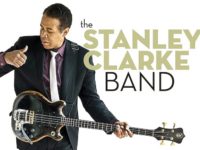Bassist Richie Goods was dubbed “my left-hand man” by Mulgrew Miller, as the pianist played the bass lines with his left hand.
That’s also the title of Goods’s most recent recording, with his own takes on material by Miller. It’s his third solo release in a career that has seen him become the youngest person ever inducted into the Pittsburgh Jazz Hall of Fame. After graduating from the prestigious jazz program at Berklee College of Music, Richie moved to New York City, where he studied under jazz legends Ron Carter and Ray Brown.
We asked Richie Goods to share the albums that shaped his career:
STANLEY CLARKE – SCHOOL DAYS (1976): I had been playing bass for only one year in 1984 but I was already in a couple of bands. My neighbor told me that Stanley Clarke was in town and I asked, “Who is Stanley Clarke?” He looked at me like I was crazy and said “You don’t know who Stanley Clarke is and you call yourself a bass player? Stanley Clarke is the greatest bass player in the world.” So, I decided to go see Stanley’s show on a school night by myself when I was only 15 years old. My mind was immediately blown!
The next day, I went to a record store and picked up the record School Days and start trying to learn his solo. I then found out that Stanley played acoustic and electric bass and I wanted to be the greatest bass player in the world, and so I needed to play acoustic and electric bass and that is why I played both of them now – because of Stanley Clarke. I have still to this day never heard a bass player play that fast. I’ve always loved his use of the pentatonic scale coupled with advanced orchestrations in the music. I’ve always strived to be a well-rounded bassist that could play straight-ahead jazz, fusion, funk, classical and pop. Not many can do this like Stanley Clarke.
[SOMETHING ELSE! INTERVIEW: Stanley Clarke joined us to discuss his role in moving the bass to centerstage in popular music, and a lifetime of work with Chick Corea and Lenny White.]
HERBIE HANCOCK – HEAD HUNTERS (1973): I think the first time I heard this record I was in college at Berklee. I had heard the song “Chameleon” before, but only knew the first part of the song because everyone played that at jam sessions. Finally, I bought the vinyl record and found out that there was another section to the song. Mind blown once again! Man, when Harvey Mason comes in with that drum groove, then Paul Jackson joins in with that crazy bassline and now one knows exactly where beat one is – but it totally doesn’t matter because its grooving so hard on any side of the beat. Sophisticated funk!
Also since high school, I was very interested in music production and sonically how a record sounds. The sound of this record and the way it is produced is simply amazing. There has never been a bass player like Paul Jackson, who is to this day one of my biggest influences on the electric bass. He taught me how to play a different kind of bassline. He could be busy, rhythmically complex but always dedicated to the groove and never get in the way of what’s going on in the music. He could just lay down a nice bed of groove for the whole band to rest on.
[SOMETHING ELSE! INTERVIEW: Headhunters percussionist Bill Summers talks classic Herbie Hancock sides and later collaborations with former Art Blakey sideman Donald Harrison.]
BOOTSY COLLINS – AHH … THE NAME IS BOOTSY BABY! (1977): Growing up as a Black kid in Pittsburgh in the ’70s and ’80s, it was all about funk music. I just always remember my aunts talking about Parliament/Funkadelic, James Brown, Sly and the Family Stone, and Bootsy Collins. Back then, when you asked a Black person if they knew a particular song, you would not sing the melody, you would sing the bassline. That’s how Black people in the ’70s and ’80s identified a song, by the bassline. Bootsy Collins had the craziest basslines ever and is the funkiest dude to ever walk this planet.
From age 5, I was studying piano and drums but as soon as I got my hands on a bass guitar (around the age of 14), the first thing I did was steal … I mean “borrow” my older sister’s vinyl record Ahh… The Name Is Bootsy Baby! I then started to learn my first bass solo from the song “Munchies For Your Love.” (Side note: A lot of people think this song is about his love to a Black woman, but its actually a song about his love for his bass guitar which he refers to as his “Chocolate Star”). Bootsy’s solo on this song is the reason why I use effects on my bass today, such as distortion, delay and envelope filters. This is where I get my uncut funk from. It started with this record. And I do like my funk uncut and on the one, Baby Bubba!
- Jon Anderson, Reza Khan, CSNY + Others: Ross Boissoneau’s Best of 2024 - December 30, 2024
- Tower of Power, Jennifer Hudson, Ben Folds + Others: 2024’s Seasonal Sounds - November 25, 2024
- Dave Bainbridge of Downes Braide Association: The Albums That Shaped My Career - October 9, 2024




